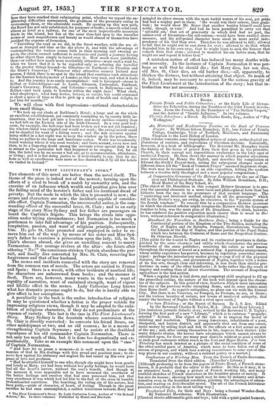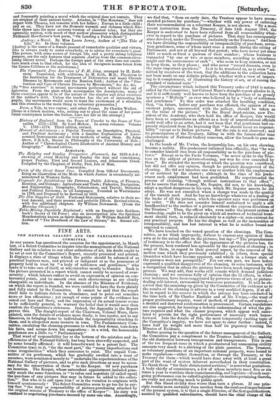PUBLICATIONS RECEIVED.
Boors.
Private Trials and Public Calamities ; or the Early Life of Alexan- drine des Echerolles, during the Troubles of the First French Revolu- tion. From the French, by the Translator of "The Sicilian Vespers," and the Author of "Gentle Influence." In two volumes.
Christie Johnstone; a Novel. By Charles Rende, Esq., Author of "Peg Woffington."
An Historical and Explanatory Treatise on the Book of Common Prayer. By William Gilson liumphry, B.D., late Fellow of Trinity College, Cambridge Vicar of Northolt, Middlesex, and Examining Chaplain to the Lord Bishop of London.
[This volume contains some biographical notices of saints, archaeological ex- planations of customs, and expositions of Christian doctrine. Essentially,
however, it is a book of bibliography. The Reverend Mr. Ilumphry. traces
the history of the forms of prayer from their first germ in the primitive Church, to their corrupt and superstitious exuberance in the later ages of mediaeval Popery. He then shows the manner in which popular alterations were introduced by Henry the Eighth, and describes the compilation of Edward the Sixth's Prayer-book, noting the subsequent changes made at
different times till the " Book of Common Prayer" assumed its present shape. The work may be recommended as an able exposition hitting the medium between a treatise drily theological and a mere popular compendium.] A Comparative Grammar of the Hebrew Language, for the use of Clas- sical and Philological Students. By John William Donaldson, D.D., Head Master of the Bury School, &c.
[The object of Dr. Donaldson m this compact Hebrew Grammar is to pre- sent the essential elements in a more lucid and philosophical form than has hitherto been the case in the grammars of that ancient language. Tho " uninviting and irrational method adopted in all the grammars" which fell in the Doctor's way, are owing, he conceives, to the ' puerile system of the Jewish teachers." To remedy this by a comparative Hebrew grammar in which the classical scholar might compare the Hebrew with the languages familiar to him, was the main plan of Dr. Donaldson. We think, however, he has rendered the positive exposition much clearer than is usual in He- brew, without reference to comparative illustration.]
Handbook for Travellers in Southern Italy ; being a Guide for the Continental portion of the Kingdom of the Two Sicilies, including the
City of Naples and its Suburbs, Pompeii, Herculaneum, Vesuvius, the Islands of the Bay of Naples, and that portion of the Papal States which lies between the Contorni of Rome and the Neapolitan frontier. By Octavian Blewitt. [This guide for the tourist to Naples and its continental provinces is distin- guished by the same clearness and utility which characterize the previous handbooks of the same publisher; rendering his rubric as well known throughout the regions of travel as a national flag. A. particular arrangement, whose utility experience has proved, becomes by repetition somewhat stereo- typed : perhaps the introductory matter giving a coup d'ccil of the physical features, the agriculture, and government of Naples, together with a notice of its fine arts, though close and informing, is less fresh than similar pro- ductions in some of the other handbooks; it looks rather like the result of inquiry and reading than of direct observation. The account of Neapolitan agriculture is the best section.
When a regular form is laid down and competent skill employed to fill up the prescribed outline, the nature of the book will depend upon the charac- ter of the subjects. In this point of view, Southern Italy is more interesting
than any of the previous works excepting Rome, and in some points more than Rome itself. As regards antiquities, no place can vie with the Eternal City. But there is no Vesuvius, no Pompeii, no Paestum, no sea, at Rome; nor the various beauties of nature, nor towns of mediwval antiquity, that render the territory of Naples without a rival upon earth.]
I've been Thinking ; or the Secret of Success. By A. S. Roe. Edited by the Reverend Charles B. Tayler, M.A. (Run and Read Library.)
[An American juvenile didactic story, revised by the Reverend C. B. Taykr ; forming the first part of a new " Library," which is to embrace " properly- selected " fictions. The object of the tale is to impress the moral of thinking and resolution. Three young Americans, inhabitants of a poor, dissipated, and barren district, and apparently shut out from any career,
make money by selling fruit and fish to the officers at a fort across an arm of the sea ; and, after raising themselves in life, improve their district. Like many didactic stories, the heroes have advantages which cannot always be calculated upon, for there are many poor districts without so good a market or such good customers within reach as the Fort and Major Morris. I've been Thinking has much interest as a picture of the social condition of some of the older-settled parts of America, which seem to have fallen out of the stream of progress, and which bear a strong resemblance to some out-of-the- way places in our country, without a resident gentry or a market.] COtifessi&ns of a Working Han. From the French of Emile Souvestre. ranslnted from the third edition. (Traveller's Library.) [Although professing to be from the papers of Pierre Henri, a French stone- mason, it is probable that the editor is the author. Be this as it may, it is an attractive book ; giving a picture of French working life, and many truthful sketches of French characters in the humbler grades of society. It has also its lessons; showing how much may be done by industry and deter- mination even in the humblest condition pointing the advantages of educa- tion, and reading an Anti-Socialist moral. The art of the French littirateur presents everything in the most telling way.] Tangkwood Tales, for Girls and Boys : being a Second Wonder-Book. By Nathaniel Hawthorne. With Illustrations. [Classical stories addressed to girls and boys ; told with a quiet quaint humour,
and frequently pointing a moral which the original does not contain. They are stripped of their ancient laxity. Ariadne, in "The Minotaur," does not depart with Theseus, but remains with her father; Europa is a little child ; and so on. They have not the Homeric warmth and nchness which Nie- buhr threw into his more accurate version of classical tales; but they are agreeably written, with much of that mellow pleasantry which distinguishes Nathaniel Hawthorne's best poem, " On Lending a Punch-Bowl.")
Audrey; a Novel. By Miss Laura Jewry, Author of "„The Tide of Life," &c. In three volumes. [Audrey is the name of a female peasant of remarkable qualities and virtues, who is always ready to assist everybody, or to advise for everybody's good. This person, with some scenes of foreign life, and a pretty strong religious =gslare the only features that separate Audrey from the common circu- ibrary noveL Perhaps the foreign part of the story does not contri- bute much even to that effect, for the idea of foreigners seems taken from the Causes Celabres or the melodrama.] The Gymnastic Free Exercises of P. IL _Ling, arranged by H. Roth-
stein. Translated, with additions, by Al. Roth, M.D., Physician to the Institution for the Treatment of Deformities and many Chronic Diseases by Movements and the Russian Bath ; Author of the "Pre- vention and Cure of Chronic Diseases by Movements," &c. &c. &c. [By "free exercises" is meant movements performed without the aid of apparatus. From the plate which accompanies the descriptions, many of these exercises appear to be of the nature of the simpler and drier exercises of the soldier's drill. Unless the teacher has the art of interesting his pupils, the movements would seem to want the excitement of a stimulus, and this stimulus is the main thing in voluntary gymnastics.]
Irene, a Tale, in two cantos ; and other Poems. By Charles Walker. [Irene is a Greek maiden, who, setting out to plead the cause of her perse- cuted countrymen before the Sultan, loses her life in the attempt.] History of England, from the Peace of Utrecht to the Peace of Ver- sailles. 1713-1783. By Lord Mahon. In seven volumes. Volume V. 1763-1774. Third edition, revised. Manual of Astronomy ; a Popular Treatise on Descriptive, Physical, and Practical Astronomy ; with a familiar Explanation of Astro- nomical Instruments and the best methods of using them. By John Drew, F.R.A.S., Doctor in Philosophy of the University of Bale ; Author of " Chronological Charts Illustrative of Ancient History and Geography." Second edition.
ALMANACS.
The Holyday and Sunday Prospective Almanack, for 1853-4-5-6 ; showing of every Holyday and Sunday the date and coincidence, proper Psalms, First and Second Lessons, and Athanasian Creed. Compiled by the Chaplain of Dalby, Peel, Isle of Man.
PAMPHLETS.
Precis of the Great Surat Case. Compiled from Official Documents. Being an illustration of the Mode in which Justice is occasionally ad- ministered in Western India.
Proposals for Establishing the Paterson Public Library, of Finance, Banking, and Coinage ; Agriculture and Trade ; Fisheries, Navigation, and Engineering ; Geography, Colonization, and Travel; Statistics and Political Economy, in ali Languages. Founded inWestminster in 1703, and Proposed to be Revived in 1853. The New Supplies of Gold. Facts and Statements, relative to their ac- tual Amount, and their present and probable Effects. Revised edition, with five additional chapters. By William Newmarch. (From the Morning Chronicle.) Table-Mooing Popularly Explained; with an Inquiry into Reichen- bach's theory of Od Force ; also an investigation into the Spiritual Manifestations known as Spirit-Rappings. By William Radcliff Birt, Author of "The Handbook of the Law of Storms," &c. Second edi- tion.

























 Previous page
Previous page